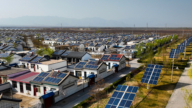【新唐人2014年06月23日讯】中国的房市下滑正在威胁中国的其它经济领域。从建筑工人的工资到家俱需求,再到钢材市场的销售,一切与房地产有关的领域都受到了冲击。“瑞士银行”经济学家指出,房地产“更持久和更急剧下滑”的风险,是中国经济今、明两年面临的最大风险。
美国《华尔街日报》5月报导说,房地产的虚弱,被视为中国放缓经济的显着威胁,因为这个行业跟如此多的其它行业互相交织,包括钢铁、水泥和家电。美国金融服务集团“花旗”估计,房地产投资直接贡献中国GDP的12%。但是美国三大信用评级公司之一“穆迪”的分析师认为,如果加上付给建筑工人的薪水和相关行业的产出,它对GDP的贡献超过20%。
而根据美国最大金融服务机构摩根大通的分析师表示,如果中国的房地产投资继续放缓5%,则将削减中国已经疲软的GDP增长速度0.6个百分点。在中国未来几个季度,通过房地产投资放缓和土地销售收入下滑,房市调整可能构成最大的宏观风险。
确实地产市场以外的其它行业,已感受到楼市滑坡的影响。据官方数据,今年前五个月,建筑和改造,包括内部装修开支的增长率已降到14.2%,而去年同期增长率为22.1%。
据中共统计局的数据,今年前五个月,家俱销售额同比增长14.7%,家电销售同比增长7.3%。去年同期,家俱销售的同比增幅为21%,家电为21.5%。
浙江财经大学教授谢作诗认为,房地产加上相关产业占据中国经济的三分之一,楼市下滑当然对经济会产生很大影响。此外,楼市对经济的影响还将从企业债务体现出来。
谢作诗:“企业债务很高的。它更多是以房产来作抵押的。这下房价一跌,债务就会恶化嘛。可能会形成债务链断裂,引起支付的困难。”
宁夏燕宝钢材市场有限公司经理杨利民对《华尔街日报》表示,现在通常是建筑公司一年中最忙的时候。但公司今年只销售了10万吨钢材,同比减少30%。
附近出售大理石和瓷砖的批发市场情况大体相同。一位销售经理告诉《华尔街日报》,5月份以来销售直线下滑,公司有价值人民币1000万元的未售出瓷砖躺在仓库里蒙灰。
农民工也遭遇没活干的穷境。报导引述在上海打工的建筑工人李贵全的话说,由于房地产市场不景气,他们今年有了更多的“休息”时间。李贵全的工作是安装水管。他说,从2月份以来就他没活干了。只好靠着老板给的每月人民币1,000元的固定薪水过活。
而在东莞市的一个家俱广场,将近三分之一的摊位都是空的。报导说,一家销售家俱和装饰品的商店老板陈晓莹表示,尽管他们公司进行了七五折促销,但还是生意清淡。她说,租约到期后她会把店铺关掉。
中国互联网综合门户网站《腾讯》财经频道原编辑张贾龙,日前向《新唐人》表示,中国从1998年到现在,房地产是比较重要的一个支柱产业,并且现在已经是中国最大的一个产业。它如果不好了,整个中国经济肯定都会受到非常大的影响。
《腾讯》财经频道原编辑张贾龙:“如果说成交量下降特别快的话,它(房屋)就会降价,如果一降价的话,政府卖地就卖不了了。然后相关的税费就会下降。有一些中小型的房企可能会出现破产。还有一些以前买房子的人会找它。打砸售楼处之类的。”
《华尔街日报》根据统计局公布的数据计算出来的结果显示,5月份中国70个大中城市新建住宅平均价格,环比下降0.15%。报导说,这是自2012年5月以来,中国新建住宅均价首度环比下跌。而上海和深圳的房价也小幅下降,表明房价跌势开始向一线城市蔓延。
“穆迪”上个月削减了中国房地产行业的前景,从“稳定”下调为“负面”,并指出,中国的销售增长放缓、市场上大量供应过剩。
采访编辑/秦雪 后制/舒灿
Real Estate Market Downturn Endangers China’s Economy
The slacking-off real estate market in China has impacted
other interrelated industries.
Construction workers’ wages, furniture sales, sales of steel
and other areas connected with the real estate industry all got hit.
Economists UBS bank pointed out that the continuously and
sharply decreasing real estate market will endanger
China’s economy this and next year.
As reported by the Wall Street Journal in May,
the weakening real estate industry has been driving
China’s weakening economy.
The real estate industry intertwines with other industries,
for instance, iron and steel, concrete as well as home appliances.
As estimated by Citi Group, investment in real estate
contributes as much as 12% to China’s GDP.
However, analysts from Moody’s, one of the three biggest
credit rating companies in the United States,
stated that if the wages paid to construction workers
and the proceeds from related industries were counted,
China’s real estate contributes more than 20% to its GDP.
Analysts from JPMorgan think that if the investment in
China’s real estate decreases another 5%, it’ll hit China’s
weakening GPD growth by another 0.6 percent.
In the following few quarters, the slow down investment in
real estate and the decreasing sales revenue from land sales
may develop a macro-environmental risk.
Indeed, industry beyond real estate also got impacted
by the continuously weakening real estate market.
Based on official data, during the first 5 months of 2014,
the spend on home construction and renovation,
including interior decoration, has decreased by 14.2%;
whereas, during the same period last year,
the increasing rate was 22.1%.
From statistical data of the first 5 months of 2014
published by the party’s Statistical Bureau,
the year-on-year growth of furniture sales was 14.7%,
and the year-on-year grow of electrical appliances was 7.3%.
In contrast, it was 21% and 21.5% during the same period last year.
Xie Zuoshi, professor of Zhejiang University of Finance & Economics,
stated that real estate and its interrelated industries
account for one-third of China’s economy.
The slow-down will endanger the economy severely.
In addition, the impact from the real estate industry will
demonstrate itself by corporate debt.
Xie Zuoshi: “Companies pile up debt by
using their properties as collateral.
Now property prices have gone down, default risks will shoot up.
It’s possible the debt chain will break and
it’ll be challenging to pay them off.”
Yang Limin, manager of Ningxia Yan Bao Steel Market Co. Ltd,
told Wall Street Journal right now should be the busiest season
for construction companies. Yet, this year,
his company only sold 100,000 tons of steel products,
a decrease of 30% compared to last year.
It’s a similar situation for those who sell marble or tiles.
A sales manager told the Wall Street Journal,
sales have been sharply decreasing since May.
They still have piles of unsold tiles worth 10 million
Chinese Yuan lying in the storage room.
It’s also challenging for migrant workers to find a job.
In the report, a construction worker Li Guiquan said that
they have a more relaxing time this year since
the real estate industry has been slow.
Li is a plumber and said he hadn’t had any business
since February. Now he lives on the 1,000 Chinese Yuan
fixed amount of money paid by his boss every month.
In a furniture market in Dongguan,
about a third of the booths are empty.
Chen Xiaoying, who sells furniture and decorations,
said that even when their company offered 25% discount,
their business is still very slow.
Chen said her store will be shut down after the lease expires.
Zhang Jialong, former editor of Tencent’s
finance and economic channel,
told NTDTV that the real estate industry has been functioning
as a pillar supporting China’s economy since 1998.
Now it has evolved into the biggest industry in China.
If the real estate market crashes,
it’ll severely impact China’s economy.
Zhang Jialong: “If sales volume continues dropping fast,
home prices will go down. Once home prices come down,
the governments can’t sell the land out.
Then the tax revenue will go down accordingly.
Some small and medium-sized developers might go bankrupt.
Moreover, those who bought homes from bankrupt developers
will search for them and smash sales offices. ”
Based on data published by the party’s Statistics Bureau,
the new home average price has gone down by 0.15%
in 70 big and medium cities in May. The report, says
it was the first time new home prices dropped since May 2012.
Home prices in Shanghai and Shenzhen also went down slightly.
It shows that the lowerprices have been spreading to the big cities.
Last month, Moody’s downgraded the outlook of China’s
real estate industry from “stable” to “negative”.
It also pointed out that the housing market has slowed
and supply exceeds demand.
Interview & Edit/QinXue Post-Production/ShuChan





























